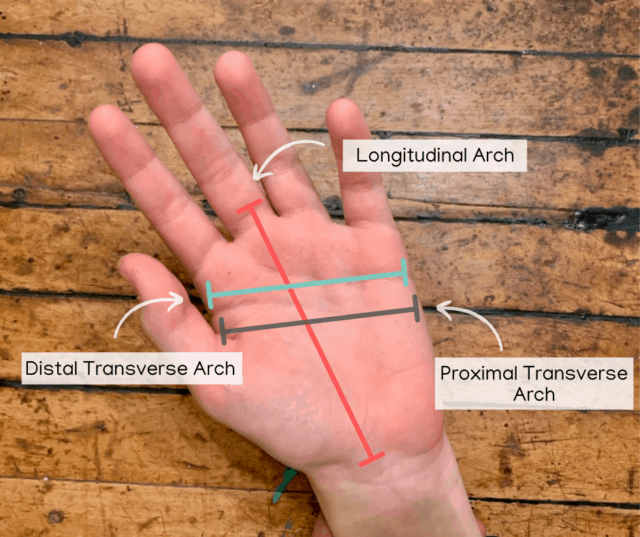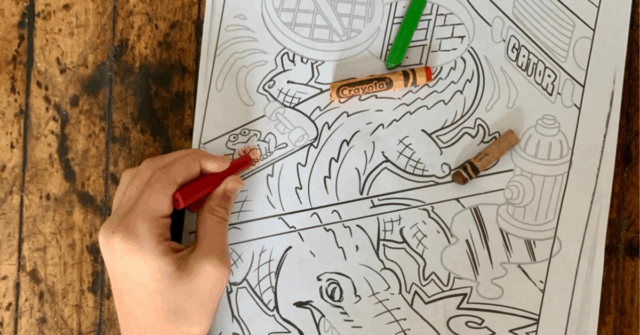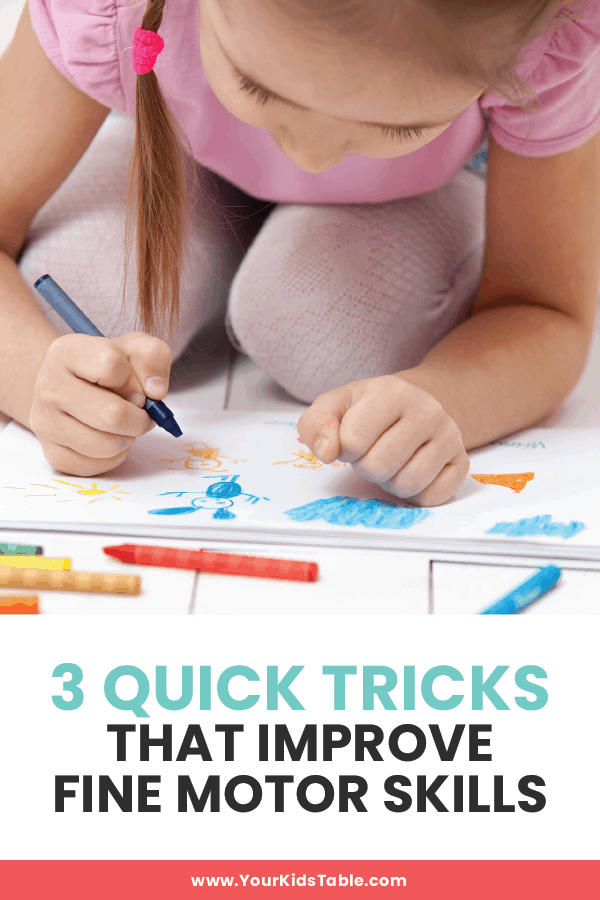Whether your child has a fine motor delay or not, these three tricks are perfect for improving fine motor skills in your child. They don’t require any special set up, just some small adjustments to the activities they’re already participating in.
Last year, at my youngest son’s preschool parent teacher conference, it was suggested that I consider occupational therapy to improve my son’s fine motor skills. As a pediatric occupational therapist, I was really hoping the teacher didn’t know what my profession was because shouldn’t my son have great fine motor skills? My hope didn’t last long, as she quickly added, “I know what you do for a living.”
This is my third son, he was developing well in so many other areas, and while I knew his fine motor skills were a little behind, I wasn’t sure it was quite time for OT. Of course, I had been encouraging fine motor activities with my son, but he wasn’t interested.
And, up until that point, I knew battling over participating in fine motor activities was going to make him hate them even more.
At his age, I knew he likely just needed some more practice. We started to work on it at home, we even created a little fine motor obstacle course. His skills improved and after a few months of kindergarten, he’s totally on track!
And, while we did do some specific activities, as an OT, I want to share some of our fine motor tricks that are easy to use during your child’s regular play. They are super easy, but target improving fine motor skills directly!
Why Are Fine Motor Skills Important?
Fine motor skills are important because without them, children have difficulty:
- Writing/coloring
- Typing
- Fastening clothes (buttons, zippers, shoe tying)
- Using utensils to eat
- Cutting with scissors
We all want our kids to be independent and feed and dress themselves. We want our kids to write their names and be able to use a computer efficiently. To do all these things, the muscles in the hands need to be strong and coordinated.
Is it Necessary to Improve Fine Motor Skills?
Many kids have fine motor delays, like my son. Some are very minor, and some are bigger. It takes a lot of time and practice to improve skills. If you’re concerned about your child’s fine motor skills, or their teacher is, then using these tricks and other activities can make a big difference.
Even if your child doesn’t have any fine motor delays, the tricks you’re about to learn will help to prevent any potential delays and only strengthen their skills!
However, if your child doesn’t have any delays or fine motor concerns, then these activities aren’t necessary, but regardless, they’re beneficial for their development.
3 Quick Tricks for Improving Fine Motor Skills
I used the tricks below with all of my kids from a young age. My youngest was reluctant to participate in them, truly I believe because by age 2 he was obsessed with sports and that was his focus. If your child doesn’t participate in these activities, that’s okay. Look for opportunities to create them.
These tricks are important to me, because they don’t require a lot of set up, if any. I believe you’re far more willing to follow through with fine motor activities if it’s part of your regular routine. Something that requires almost no effort. At least that’s true for me.
Fine Motor Trick #1: Lay On Belly When Playing
Anytime your child is writing, drawing, reading, playing a game, or playing with toys, encourage them to lay on their belly because it actually helps strengthen their core and shoulders. Both are absolutely necessary for improving fine motor skills.
Some kids have fine motor weakness because of poor core and shoulder strength. Think about it, if they aren’t stable at their center, the tips of their fingers aren’t going to be able to stabilize and coordinate movement well.
Laying on their belly, or as OT’s say, in a prone position, also naturally forces kids to shift their weight around, often on the palms of their hands as they get up and down, as well as adjust themselves. This full weight on their hands actually strengthens the hand and develops the arches in the palm that are necessary for fine motor skills.

If your child hated tummy time as a baby, this is even more important for them, because they need to develop those arches for fine motor skills. They’ll likely still be sensitive to this position. If they are, you’ll notice squirming, rolling on to their side, laying their head down, or even holding their breath. Plus, this position is also good for other areas of their development, like sensory processing.
If you notice your child is playing or doing an activity and they’re just sitting still, you can say something like, “Oh that looks like fun, try laying on your belly while you color/play/etc.” Some kids will give it a try, if your child refuses, then let it go for the moment and look for other times to begin an activity that way.
For instance, if your child asks to play Candyland, say: “Sure, let’s lay on the floor.” They likely won’t think much of it. Or, if they want to color, pull out their supplies and set them up on the floor and say, “It’s fun to color on the floor.”
Your child may only be able to tolerate lying on their belly for a few minutes, that’s okay. Ultimately, you want to work your way up to 20-30 minutes, which could take several months.
Fine Motor Trick #2: Color With Broken Crayons
Don’t you dare throw away those broken crayons, in fact, break them on purpose! Short broken crayons force a child to use the correct grasp with their dominant hand while improving fine motor skills. Kids will often grab a pencil or crayon and hold it awkwardly because they don’t have the strength to hold it the right way.

If you have a toddler or preschooler, consider these larger crayons. Regular sized broken crayons may be too much of a challenge. I’d much rather a child hold a thicker crayon or pencil, but have their fingers in the correct position, as opposed to using a regular crayon with a funky, inefficient grasp.
When it’s time to color, pull out a few broken crayons, nonchalantly. Don’t make a big deal about it. Some kids will have no problem using broken crayons, or even notice.
If your child complains about the broken crayons, try to demonstrate using them yourself. Encourage and keep it as fun as possible. If they continue to complain, then say, “Oh sure, I’ll get the other ones, just give me a minute.” Make yourself busy and stall as long as you can before they totally give up trying to use them.
Fine Motor Trick #3: Roll and Pinch Playdough
Most kids are playing with playdough at least from time to time, when your child does, encourage them to do the following actions:
- Roll it like a snake
- Pinch the snake with index finger and thumb (focus on having them isolate just those two fingers)
- Cut the snake into tiny pieces with scissors
Each of these actions helps improve fine motor skills in children. Playing with playdough in general is good for fine motor skills, but I’ve noticed that kids with fine motor weakness tend to play with it very superficially and they may ask adults or an older sibling for help rolling it out or into a ball.
Or, they’ll stick a few things in the playdough, but avoid squeezing it, breaking off small pieces, rolling it, and any other actions that require their fine motor skills.
Whenever a child is struggling with a challenge, it’s important to find the just right challenge for them. You don’t want it to be too hard or too easy. This definitely can take some experimenting.
Playdough is a perfect example of this. If you suggest that your child try to roll a snake and they try and can’t do it at all, you’ll want to make it a little easier for them. Give them a bigger or smaller piece of playdough? Start the snake for them? Whatever will make it easier. If a child feels they won’t be successful at all, they’ll likely give up.
At the same time, if it’s too easy, you really aren’t helping them improve their fine motor skills.
Affiliate links used below. See our full disclosure.
Fine Motor Activities and Games
If you’re ready to dive into more fine motor activities, here are a few simple ones. Some are games that are OT favorites for improving fine motor skills, others are simple crafts:
- Mr. Potato Head
- Kerplunk (4-5 years old +)
- Hi Ho Cheerio
- Cut a slot in the lid of an empty container and push pennies through it
- Cut all kinds of paper, thick and thin
- Wheelbarrow walk (also develops arches in hands)
- Create a simple fine motor obstacle course (click the link to see the one I created)
- String beads
- Dig pom poms out of a whisk (sounds strange, but so simple and brilliant. Check out how to do it here)
- Use tweezers to pick up pom poms or small toys and put in a bucket
What fine motor skill concerns do you have for your child? Tell us in the comments below, we love to hear from you and reply to every single one.
More on Child Development
Top 10 Sensory Swings for Kid’s Development and Sensory Processing
Learn Crossing Midline Activities to Improve Your Child’s Development!
Incredible Child Development Toys to Help Your Child Thrive
Alisha Grogan is a licensed occupational therapist and founder of Your Kid’s Table. She has over 20 years experience with expertise in sensory processing and feeding development in babies, toddlers, and children. Alisha also has 3 boys of her own at home. Learn more about her here.

My son just turned 8 (born at 24 weeks premature, has ASD and ADHD) He really struggles with fine motor. Putting on socks is still a challenge for him. Printing is very challenging for him. I’d like to help him develop his fine motor. How often should we do these activities?
Hey Amy,
I’d try to be incorporating these daily when you see the opportunity. Getting them to be prone when you see them reading a book is an easy one. Incorporating the other into daily asks as well, but keeping it fun and different so they don’t loose interest.
Best,
Desiree